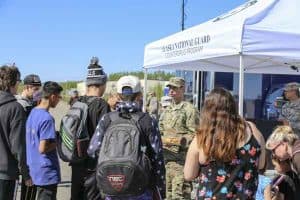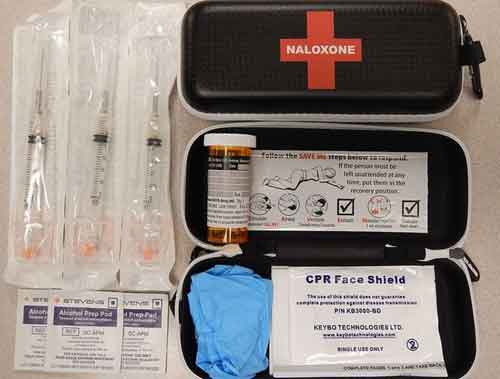
JOINT BASE ELMENDORF-RICHARDSON, Alaska —Alaska National Guardsmen from the Counterdrug Support Program traveled to Galena, Alaska, May 31, to disseminate Narcan kits and other drug and alcohol education and prevention materials to local residents.
The AKNG CDSP partnered with the Alaska Department of Health and Social Services Division of Public Health under Project Hope to create and disperse kits that contain prescription medicine, Naloxone, which blocks the effects of opioids and reverses an overdose.
“Galena doesn’t have a lot of opioids here, but there’s always the potential in the future,” said Sgt. Elijah Gutierrez, a civil operator with the CDSP. “We want to bring out education, prevention and a method to reduce harm now versus when it is too late.”
Heroin-related overdose deaths have nearly quadrupled in the state from 2009 to 2015. Gutierrez explained that the vision of the civil operations mission is to talk with people in the community and find out what is going to make their situation better.
“We don’t try to go out and say ‘this is what you need now, this is what is going to fix you;’ that’s never the case.” explained Gutierrez. “Communities know what they need.”
With no connecting road systems outside the Yukon River village, Guardsmen traveled 350 miles north via a C-17 Globemaster III aircraft crewed by the Alaska Air National Guard’s 249th Airlift Squadron to complete the mission.
The twelve Guardsmen set up a booth that included a variety of drug and alcohol prevention material, training aids and giveaway items at the Edward G. Pitka Sr. Airport. They offered brief prevention lessons to residents and answered their questions while they interacted at the outdoor display near the runway and the parked C-17.
“Part of the distribution of the Narcan involves a briefing,” explained 1st Lt. Kimberly Conkling, CDSP coordinator. “There is information on how to administer the kit, when it should be used and what are the signs and symptoms for an opioid overdose.”
Community members were also encouraged to shoot at a basketball hoop wearing goggles that simulated impaired vision. Some of the Guardsmen left the airport and walked door-to-door in the community of approximately 500, inviting them to visit the CDSP booth, tour the military aircraft and talk with Guardsmen who traveled to Galena that day.[xyz-ihs snippet=”adsense-body-ad”]“We reach out to support community based organizations and identify gaps in resources and capabilities and we try to fill those gaps,” explained Conkling, describing the mission of the CDSP. “Our civil operations mission aims to reduce the impact of illicit drug use and drug misuse in our state.”
Gutierrez says that education and prevention are additional important steps necessary for treating the epidemic.
“Using Narcan as a fix-all is not the case,” said Gutierrez. “It’s really a band aid to stop the bleeding; people were dying and this is a way to save lives.”
The AKNG and DPH partnership comes on the heels of Alaska Governor Bill Walker’s administrative order directing all state departments to apply for federal grants to help fund prevention and treatment options.
Gutierrez explained that the funding for Project Hope is through a federal grant. The state of Alaska will receive 4.3 million dollars over a four-to-five year timeframe, the highest amount of the eight states that are receiving the grant.
“Initially when Project Hope started, the goal was to get out 1,300 kits and we are upward of over 5,000 kits dispersed,” said Gutierrez, who is embedded in the DPH office two days a week. “The need is out there and meeting that demand has been challenging but very rewarding.”
As a regional hub, Galena provides the capacity to deliver information and resources to other communities in the Yukon-Koyukuk Region.
Source: Department of Military and Veterans Affairs[xyz-ihs snippet=”Adsense-responsive”]







